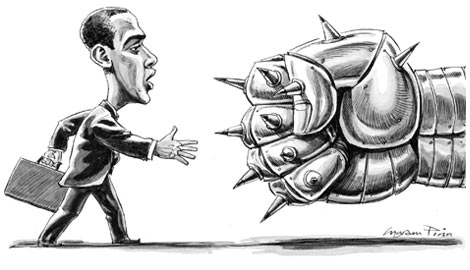The Persistent Myths of ‘Soft Power’
LSE IDEAS |

By Parag Khanna
The difference between the upcoming U.S. presidential election and previous iterations is that Republicans no longer have the upper on foreign policy. Their self-proclaimed monopoly on national security expertise hand and belief in a muscular international posture collapsed with John McCain’s presidential bid. We can now have honest foreign policy debates on how to actually handle real-world challenges like nuclear proliferation, the rise of China, terrorism, failed states rather than assuming a priori which side would be better at tackling them.
Nonetheless, one of the great intellectual divides that emerged during the previous decade of partisan clarity—and unfortunately persists today—has been the notion of ‘soft power.’ Coined by Harvard Kennedy School professor Joseph Nye, the term astutely captured the need for America to not only wield its military might as the George W. Bush administration did immediately after 9/11, but also to exercise its ability to compel and attract. (The eponymous book Soft Power was published in 2004.)
Like ‘Clash of Civilizations,’ the repetitive dissection of ‘soft power’ over time has only further muddied and corrupted whatever utility the phrase might once have had in its original formulation. Both terms are provocative rejoinders to the spirit of the times, but neither is analytically rigorous enough to improve policy. If anything, their endless hijacking has derailed serious policy discussions, diluting them into sophomoric academic stand-offs.
Moving forward, we need a far more neutral baseline in assessing power based not on a latent accounting of inputs such as nuclear stockpiles and Hollywood films produced, but on outputs: does it work? If the power you have is the wrong sort to get you what you want, then it is useless. With this in mind, Nye’s Future of Power (2011) is a fine book but adds little to the analysis of non-state influence on world affairs beyond what Jessica Mathews accomplished in just one essay titled “Power Shift” published in Foreign Affairs in 1997. Numerous scholars have contributed far more substantially to the study of private authority and influence over conflict, negotiations, and outcomes.
As a student of diplomatic theory, the greatest myth elevated by the notion of ‘soft power’ is its self-identification with diplomacy and their collective antithetical role to ‘hard’ or military power. No self-respecting diplomat with a modicum of historical knowledge would ever pretend that diplomacy should unilaterally disarm and operate absent coercive threats. Indeed, great diplomats never use terms like ‘hard’ versus ‘soft’ power—they realize that diplomacy is the task of marrying a range of instruments of leverage to get the job done. The Obama administration has continued to rely on military force in Afghanistan, has deployed it in Libya, uses it to tactically intimidate Iran, and is strategically reinforcing naval assets across the Pacific to reassure Asian allies much as any Republican administration would.
It remains then for Mitt Romney, the likely Republican presidential nominee, to distinguish his approach in more depth than his platform slogan of “peace through strength,” and the claim in his recent book No Apology that he will apply “the full spectrum of hard and soft power to influence events before they erupt into conflict. Resort to force is always the least desirable and costliest option. We must therefore employ all the tools of statecraft to shape the outcome of threatening situations before they demand military action.” Thus far it sounds like Romney is challenging Obama for the Democratic Party’s nomination.
It might be interesting to interview—rather than listen to media stumps by—the would-be senior advisors to both the prospective Obama II and Republican administrations as to how they would tackle our many current diplomatic headaches such as Syria, Iran, the South China Sea and climate change, especially since so many of them are prone to using the hard/soft power jargon that obfuscates the search for real policy.
What is most curious about the persistent usage of ‘soft power’ in foreign policy and electoral discourse in America is that the term hardly resonates in such a power conscious society that still believes in its exceptionalism. For all its simplicity, it quite frankly goes over the head of most of the electorate who aren’t interested in academic debates. No one wins elections by arguing that America should use ‘soft power’.
The last decade of think-tank studies on the nature of power have come up with little more than the coinage of ‘smart power’ as a vague amalgam of hard and soft forms. Joseph Nye himself co-chaired a ‘Smart Power Commission’ whose banal conclusion was that the U.S. needs to increase spending on the State Department and shift from exporting fear to inspiring hope. As a noun, ‘smart power’ is at best redundant to diplomacy, and thus superficial, irrelevant, and distracting. At the New America Foundation’s “Smart Strategy Initiative,” ‘smart’ is used as an adjective. The program analyzes policy options, measure the costs, weigh the alternatives, and anticipate feedback loops. Nobody disputes that America has vast power, nor that it needs strategy. Answering the how to deploy that power is much more about this kind of concrete process than about creating false dichotomies that only reinforce divisions we should have already overcome.
Parag Khanna is a visiting fellow of LSE IDEAS and a senior fellow at the New America Foundation. He is author of How to Run the World: Charting a Course to the Next Renaissance (2011) and The Second World: Empires and Influence in the New Global Order (2008).